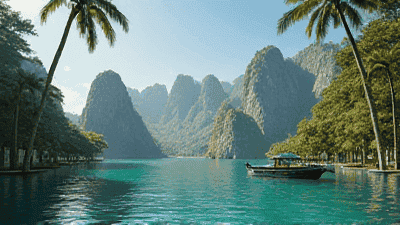
Unlocking Unforgettable Journeys: Delving into the World's Most Epic Travel Entertainment
Travel entertainment today often defaults to predictable itineraries and well-trodden paths, promising leisure but frequently delivering superficial encounters. While iconic landmarks hold their charm, a growing desire exists for experiences that transcend the ordinary—moments that deeply engage the senses, challenge perceptions, and create lasting memories. This article delves into the realm of 'epic travel entertainment,' exploring the profound, often hidden, experiences that lie beyond mere sightseeing.
The tourism landscape is rapidly evolving, driven by travelers seeking genuine cultural immersion, adventurous pursuits, and personal growth rather than just photo opportunities. The importance of authentic travel entertainment extends beyond individual gratification; it fosters cross-cultural understanding, supports local economies sustainably, and can even inspire personal transformation. However, this pursuit is often challenged by the commercialization of travel, which can commodify unique experiences or dilute their essence. The scientific community and industry grapple with defining 'authenticity' and 'epic' in a way that respects local traditions while offering accessible, impactful experiences. What impact would it have on our understanding or practice of global tourism if we failed to fully comprehend the nuances of truly epic travel, reducing every journey to a standardized product?
Defining the Unforgettable Journey

Beyond the Brochure: The Essence of Epic Travel Entertainment
Defining 'epic travel entertainment' moves beyond conventional definitions of leisure or adventure. It's not merely about the grandeur of a landscape or the thrill of a physical challenge, but rather the profound impact an experience has on an individual. An epic journey transcends passive observation, immersing travelers deeply into a destination's culture, environment, or a personal challenge that fosters significant growth. For instance, while a Caribbean cruise offers relaxation, an epic experience might involve living with a remote Amazonian tribe (indigenous community engagement), learning their ancestral ways, and contributing to their sustainable initiatives. This contrasts sharply with simply observing a staged cultural performance. The essence lies in authenticity (genuineness of the experience) and transformation (the lasting change within the traveler). Research from the World Tourism Organization highlights a growing demand for such 'transformative travel,' where personal development is prioritized over superficial consumption. These experiences often demand participation, resilience, and an open mind, offering rich rewards far beyond typical tourist satisfaction. They are the stories told for decades, not just moments captured on a postcard.
Navigating the World for Genuine Thrills
Unearthing Authentic Adventures: Strategies and Resources
Unearthing truly epic travel experiences requires moving beyond mainstream travel agents and popular search engines, which often prioritize mass-market appeal. Effective strategies involve deep research into local culture, engaging with community-based tourism initiatives, and seeking out niche operators specializing in immersive experiences. For example, instead of joining a large bus tour of the Great Barrier Reef, one might find a small, eco-conscious marine conservation project that allows participation in coral restoration (environmental stewardship), offering a hands-on, educational, and deeply rewarding encounter with the ecosystem. This approach often means embracing 'slow travel' (extended stays in one location), fostering genuine connections with local communities, and learning about their daily lives and traditions. Leveraging platforms that connect travelers directly with local guides or ethical tour operators, such as Responsible Travel or Global Footprints, can be invaluable. These resources often highlight unique festivals, craft workshops, or wilderness expeditions that are far removed from typical tourist circuits. The key is to prioritize depth over breadth, choosing fewer, more impactful experiences rather than rushing through many superficial ones.
Consider the shift in discovery methods:
| Feature | Conventional Travel Discovery | Epic Travel Discovery |
|---|---|---|
| Primary Source | Commercial Tour Operators | Local Networks, Specialty Guides |
| Experience Focus | Sightseeing, Leisure | Immersion, Personal Growth |
| Destination Choice | Popular Landmarks | Undiscovered Regions, Niche Activities |
| Interaction Level | Passive Observation | Active Participation, Engagement |
This table illustrates a fundamental difference in mindset. While conventional discovery relies on established routes, seeking epic entertainment demands a more proactive, inquisitive, and often, more flexible approach to travel planning. It's about becoming a temporary local rather than a transient visitor.
Journeys of Self-Discovery and Growth

Lasting Impacts: How Epic Travel Shapes Perspectives
The most profound aspect of epic travel entertainment isn't just the thrill of the moment, but its enduring impact on the traveler. These experiences often act as catalysts for significant personal growth, fostering resilience (ability to recover from difficulties), adaptability, and a broadened worldview. Navigating an unfamiliar cultural landscape, overcoming a physical challenge in nature, or contributing to a local community project often forces individuals out of their comfort zones, leading to a deeper understanding of themselves and the world. For instance, trekking through the Himalayas, an arduous physical journey, can simultaneously be a spiritual awakening, providing perspectives on human endurance and the sheer power of nature. These journeys cultivate empathy (the ability to understand and share the feelings of another) by exposing travelers to diverse ways of life and the challenges faced by others. Travelers often return with a heightened sense of global citizenship, a greater appreciation for different cultures, and a renewed sense of purpose. This transformative power is the ultimate reward, moving beyond fleeting enjoyment to create lasting memories and fundamental shifts in personal philosophy.
Conclusion
This exploration into 'epic travel entertainment' has illuminated a crucial distinction between superficial tourism and profoundly impactful journeys. We've delved into what defines an epic experience—its emphasis on authenticity, deep immersion, meaningful challenges, and profound personal growth, contrasting it sharply with conventional, often commodified, sightseeing. From the quiet intensity of living with indigenous tribes and learning their ancient customs, to the hands-on engagement of participating in marine conservation efforts, the essence of epic travel lies in its capacity to transform the traveler, not just passively entertain them. We’ve highlighted the importance of seeking out genuine connections with local cultures, engaging respectfully with communities, and prioritizing depth over mere breadth in our travel choices. This evolving perspective represents a growing awareness among travelers who yearn for more than just fleeting photo opportunities; they seek experiences that craft enduring stories, present enriching challenges, and offer new perspectives that fundamentally reshape their understanding of the world. By consciously embracing strategies that move beyond the well-worn paths of mainstream tourism, individuals can unearth experiences that truly resonate, proving that the world offers far more profound and personal adventures than its most famous landmarks suggest.
Looking ahead, the landscape of epic travel is poised for further evolution, driven by advancements in sustainable tourism practices and a heightened global consciousness. Future trends will likely emphasize hyper-personalized itineraries, leveraging artificial intelligence to match travelers with truly unique, values-aligned experiences that might be otherwise inaccessible. Challenges include balancing increased demand for authentic experiences with the need to protect fragile ecosystems and cultural heritage from over-tourism. Macro scientific policies supporting responsible tourism and interdisciplinary integration—combining anthropology, ecology, and technology—will be critical in developing frameworks for ethical engagement. There's a strong prospect for 'impact travel' to become a dominant force, where every journey contributes positively to the destination, whether through conservation, education, or economic empowerment. Continuous research into traveler psychology and destination management will be vital to ensure that the pursuit of the 'epic' remains genuinely transformative and sustainable. The future of travel lies in forging deeper connections, fostering mutual respect, and creating experiences that enrich both the traveler and the world they explore.
Frequently Asked Questions (FAQ)

Q: How can travelers discern between genuinely epic experiences and commercially packaged "adventure" tours? A: Discernment is key when navigating the myriad of travel offerings that often market themselves as 'epic' or 'adventure' based. Genuinely epic experiences are fundamentally rooted in authenticity and transformation, extending far beyond the superficial thrills of a commercially packaged tour. Look for several key markers. First, genuine experiences often involve local ownership and leadership; local guides and operators are more likely to offer deep, nuanced insights and ensure that benefits stay within the community. Second, group sizes are typically small, facilitating more intimate interactions and minimizing environmental impact—a stark contrast to large bus tours. Third, ethical guidelines and sustainability practices should be clearly articulated, demonstrating a commitment to responsible tourism rather than just profit. Fourth, an emphasis on genuine interaction and learning, such as participating in a local craft workshop or contributing to a conservation project, rather than merely observing from a distance, signifies a more profound engagement. Finally, transparency about the tour's impact on local culture and environment is a strong indicator of an ethical and truly immersive experience. If a tour feels overly curated, heavily commercialized, or isolates you from local life, it’s likely more of a commodified product than a truly epic journey of discovery.
Q: What are the biggest risks or challenges when seeking out less-traveled, "epic" destinations, and how can they be mitigated? A: Seeking out less-traveled, truly 'epic' destinations undeniably comes with its own set of challenges and risks, which astute travelers must proactively address. One primary concern is personal safety; remote areas might lack robust emergency services, and political stability can be unpredictable. Mitigation involves thorough pre-trip research on local conditions, registering with your embassy, having comprehensive travel insurance, and hiring reputable local guides who understand the terrain and cultural nuances. Another significant challenge lies in ethical considerations, specifically avoiding cultural appropriation or unintended exploitation. Travelers must commit to cultural sensitivity, respect local customs, dress codes, and traditions, and ensure their economic contributions directly benefit the community, not just a few intermediaries. Logistical complexities are also common: language barriers, limited infrastructure, unreliable transportation, and unfamiliar local laws can be daunting. Addressing these requires patience, flexibility, learning basic local phrases, and again, leveraging trustworthy local expertise. Lastly, environmental impact is a crucial consideration. Mitigate this by adhering to 'leave no trace' principles, supporting eco-friendly accommodations and operators, and educating yourself on the local ecosystem. The key to successfully navigating these risks is meticulous planning, cultural humility, and a willingness to adapt and learn from local knowledge.








